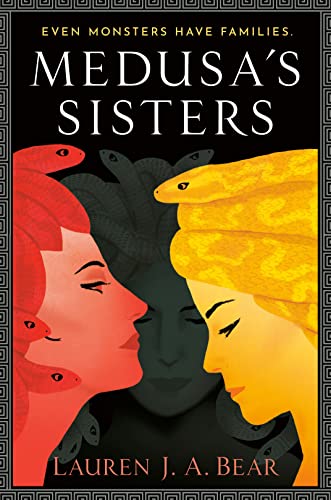Medusa’s Sisters
“Even monsters have families” is the appropriate tagline for this reimagining of the story of the Gorgons, told primarily by Medusa’s often forgotten sisters Stheno and Euryale.
Daughters of the ancient sea deities, Phorcys and Ceto, Stheno, Euryale and Medusa have other siblings, including the three Graeae, but these triplets, more human in appearance than other family members, chose to travel when they reach adulthood. Spending time in Thebes and Athens, the sisters’ characters and desires lead them in different directions even as they appear to be inseparable. Stheno is the ‘big sister’ full of concern and worry, especially for Medusa, the only one of the three who is mortal. Euryale is consumed with a desire to find love and chooses to look for an immortal lover, perhaps Poseidon, the handsome, tricky King of the Sea, while sweet Medusa engages in a love affair with the costliest of consequences.
Bear handles the different voices of Stheno and Euryale with masterful skill and wit. It’s a story full of violence, heartbreak, and sisterly infighting. Each sister’s character and decisions contribute to the disastrous fate that awaits them at Athena and Perseus’s hands. Stheno calls her fourth sister “fear,” but while fear pervades the story until Medusa meets her fate, the sisters’ story continues, and the latter stages of the novel are some of the most tender and satisfying parts of this read.
Medusa’s story is the subject of at least three new or recent novels, but with stellar writing and her focus on Medusa’s forgotten sisters, Bear’s contribution to the sub-genre of mythic retellings is not to be missed. Highly recommended.










